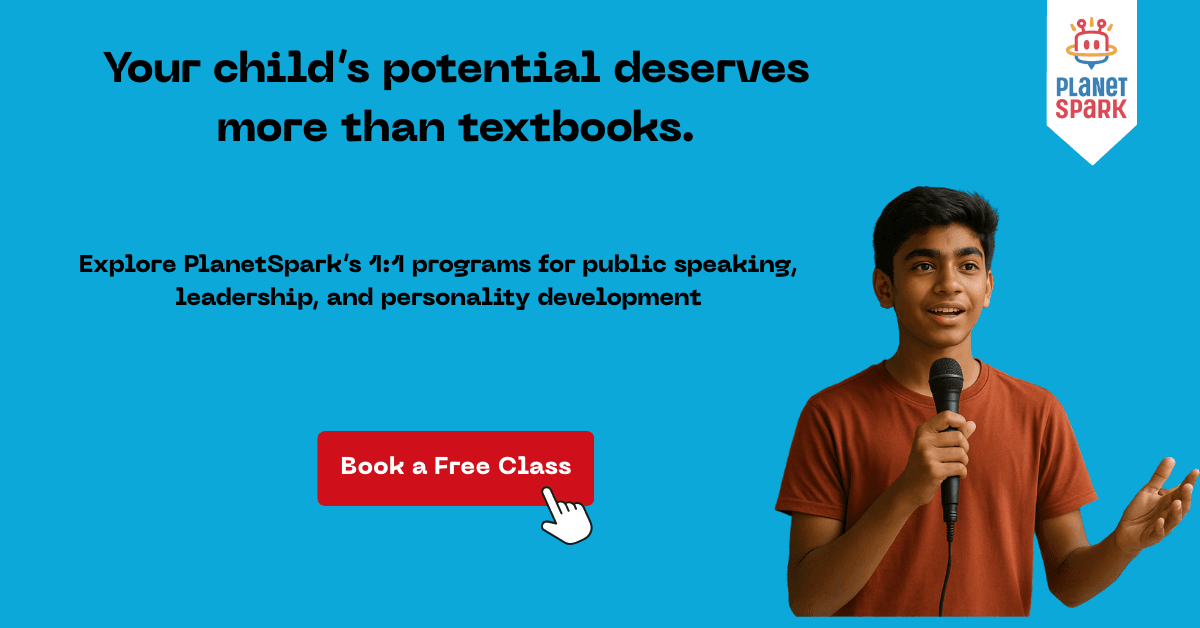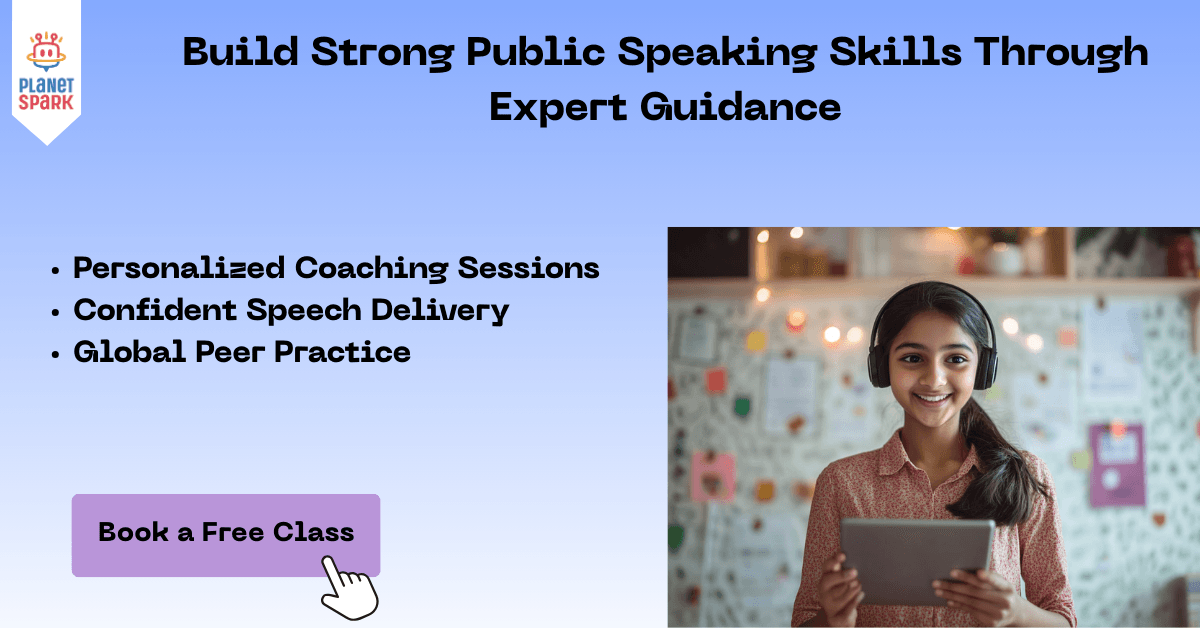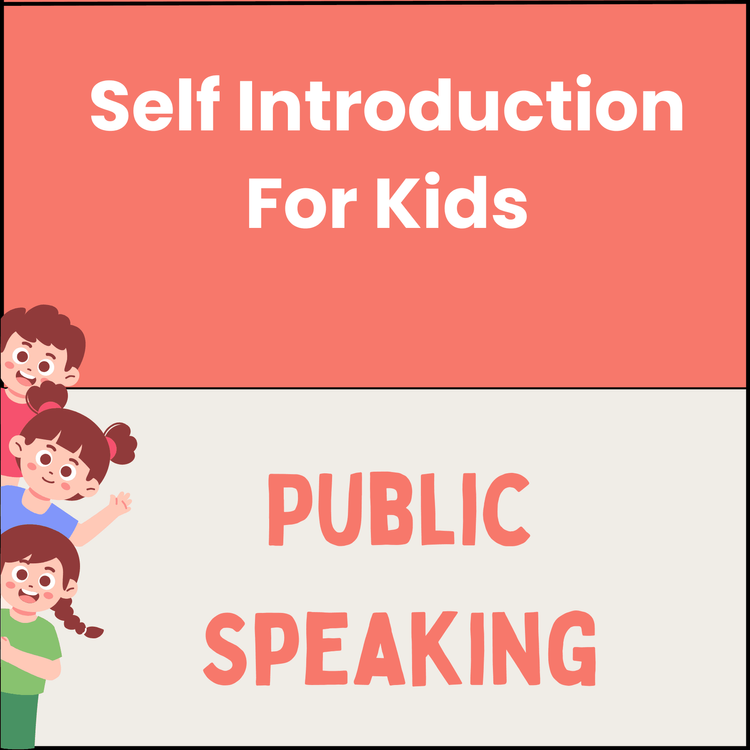Motivational Assembly Topics: Inspiring Ideas for Students

School assemblies are more than just morning prayers and announcements. They are powerful moments where the entire school community gathers together, making them the perfect platform to share important values and lessons. A motivational assembly can set the tone for the day, inspire students to be their best selves, and instill qualities like resilience, kindness, and leadership.
When students speak on motivational assembly topics, they don’t just inspire their peers they also develop their own public speaking skills, confidence, and stage presence. This makes motivational assemblies a win-win activity for schools.
In this blog, we’ll cover:
Why motivational assembly topics matter
20+ engaging topics to choose from
Tips for delivering impactful talks
Sample short speeches
How PlanetSpark’s Public Speaking Course helps students shine
FAQs to guide you further
Popular Motivational Assembly Topics
Here are some detailed motivational topics students can present during assemblies:
1. The Power of Positive Thinking
How positive thoughts influence our actions and outcomes.
Famous examples: Thomas Edison’s persistence, Helen Keller’s optimism.
Takeaway: “What you think, you become.”
2. Discipline is the Key to Success
Discipline builds habits that shape our future.
Real-life inspiration: Athletes and scientists who follow strict routines.
Message: Without discipline, talent and intelligence go to waste.
3. Never Give Up: Learning from Failures
Highlight how failure is not the end but a stepping stone.
Examples: J.K. Rowling was rejected 12 times before Harry Potter was published.
Takeaway: Success belongs to those who persist.
4. Kindness and Compassion
A small act of kindness can brighten someone’s day.
Share real-life school examples, like helping a friend in need.
Message: Kindness costs nothing but means everything.
5. Time Management for Students
Students juggle academics, hobbies, and social life.
Techniques: To-do lists, Pomodoro method, prioritization.
Takeaway: Value time it never comes back.
6. Hard Work vs. Smart Work
Hard work builds character, while smart work ensures efficiency.
Example: A farmer’s effort (hard work) + modern techniques (smart work).
Message: Both together lead to success.
7. Gratitude and Appreciation
Encourage students to be thankful for parents, teachers, and peers.
Daily gratitude builds positivity and happiness.
Simple exercise: Start the day with “one thing you’re grateful for.”
8. The Role of Self-Confidence in Success
Confidence helps in making decisions, trying new things, and facing challenges.
Example: Malala Yousafzai’s courage at a young age.
Takeaway: Believe in yourself before others do.
9. Unity in Diversity
Importance of respecting cultural, linguistic, and social differences.
India itself is a prime example of unity in diversity.
Message: Strength lies in working together despite differences.
10. The Value of Education
Education is not just about exams it shapes thinking, creativity, and problem-solving.
Example: Dr. B.R. Ambedkar, who used education to uplift himself and society.
Takeaway: Knowledge is true power.

Why Motivational Assembly Topics Matter
Assemblies may seem routine, but the words spoken during them can leave a lasting impression. Motivational topics help students see life from new perspectives and shape their personalities beyond academics.
Here’s why they matter:
Encourage Positive Values
A well-chosen topic reinforces values like honesty, discipline, respect, and gratitude. For example, a talk on “Kindness and Compassion” can encourage students to look out for each other and build a supportive environment.Boost Student Confidence
Standing in front of peers to deliver a message is an excellent way to overcome stage fright. Students gain confidence in expressing themselves, which helps not just in assemblies but also in interviews, debates, and competitions.Foster a Growth Mindset
Topics like “Never Give Up” and “Failures Are Stepping Stones” teach resilience. They remind students that challenges are not obstacles, but opportunities to grow.Unify the School Community
Assemblies bring everyone together. A motivational topic can serve as a collective reminder of what the school stands for and what values it wants to promote.Encourage Lifelong Skills
The art of motivational speaking improves communication, leadership, and empathy—all essential skills for personal and professional success.
Encourage Your Child’s Confidence!
School assemblies are the perfect stage for students to showcase their public speaking skills. Don’t let fear hold them back.
Join PlanetSpark’s Live Public Speaking Classes today!
Sample Short Motivational Speeches
Example 1: Never Give Up
“Good morning everyone! Today, I want to talk about failures. We all fail sometimes in exams, competitions, or life. But failure is not the opposite of success; it is part of success. Great people like Edison and Rowling never gave up despite failing multiple times. Remember, success belongs to those who rise every time they fall.”
Example 2: The Value of Time
“Time is the most precious gift we have. Once lost, it can never be regained. As students, every hour counts—whether it’s studying, playing, or resting. If we use our time wisely, we can achieve greatness. Let us promise to value time and use it to build a brighter future.”
Example 3: Kindness Costs Nothing
“Have you ever smiled at someone and seen them smile back? That’s the magic of kindness. A kind word, a helping hand, or a small gesture can make someone’s day. Let us practice kindness daily it costs nothing but creates happiness for everyone.”
How to Deliver a Motivational Assembly Talk
Speaking in front of an audience can be nerve-wracking for students. Here are some practical tips to make the delivery effective:
Start with a Story or Quote: Example: Begin with “Thomas Edison once said, ‘I haven’t failed, I’ve just found 10,000 ways that won’t work.’”
Keep It Short and Focused: A good assembly talk should last 3–5 minutes. Don’t overload it with too much information.
Make It Relatable: Use school-life examples: exams, friendships, or sports events.
Engage the Audience: Ask questions like, “How many of you have failed in a test but tried again?”
Use Voice Modulation and Expressions: A flat speech is boring. Add energy by changing your tone for key points.
End with a Clear Takeaway: Example: So, let’s remember failures don’t define us, but how we respond to them does.
PlanetSpark’s Role in Building Confident Speakers
While assembly topics are inspiring, many students hesitate to speak in front of an audience. Stage fright, lack of fluency, or fear of judgment hold them back.
This is where PlanetSpark’s Public Speaking Course makes a difference. The program helps students:
Overcome Stage Fear: Through guided practice in a safe environment.
Learn Effective Techniques: Voice modulation, body language, and storytelling.
Gain Confidence: By practicing debates, speeches, and real-time activities.
Develop Lifelong Skills: Communication and leadership that go beyond school assemblies.

Conclusion
Motivational assembly topics are more than just words they are life lessons that can shape young minds. From positive thinking to discipline, kindness to unity, these themes inspire students to grow not just as learners, but as better human beings.
With practice and the right training, every student can become a confident, inspiring speaker. Assemblies then become not just daily rituals but transformative experiences.
FAQs on Motivational Assembly Topics
Q1. What are good topics for a motivational school assembly?
Some of the best topics include discipline, time management, kindness, failures, and self-confidence because these values are relevant to every student’s daily life. They are universal themes that inspire better habits, encourage resilience, and promote positivity. Choosing such relatable topics ensures the audience feels connected and motivated.
Q2. How long should a motivational assembly speech be?
A good assembly speech should last between 2–4 minutes. This is long enough to share a powerful story or message but short enough to keep the audience engaged. Students should focus on one central idea and deliver it with clarity instead of overloading with too much content.
Q3. How can I make my speech interesting?
To make a speech engaging, use personal stories, relatable school-life examples, or inspiring quotes. Students can also ask simple questions to involve the audience and keep them attentive. Changing voice tone, adding expressions, and using pauses effectively makes the delivery more impactful.
Q4. Why should students participate in assembly speeches?
Delivering assembly talks helps students develop self-confidence and improve communication skills. It also builds stage presence and teaches them to articulate their thoughts clearly. Most importantly, it prepares them for future challenges like debates, interviews, and leadership roles.
Q5. How can teachers encourage students to give motivational talks?
Teachers can start by giving students simple, relatable topics and guiding them through speech preparation. Providing rehearsal opportunities and constructive feedback boosts confidence. Encouragement and recognition during assemblies also motivate more students to participate willingly.
Q6. What’s the role of public speaking courses in improving assembly talks?
Public speaking courses like PlanetSpark’s help students overcome stage fear and structure their thoughts more effectively. They teach techniques like voice modulation, storytelling, and body language, which make speeches more engaging. With regular practice and trainer feedback, students transform into confident and impactful speakers.
Q7. Can motivational assembly topics be linked to academic growth?
Yes, many motivational themes directly contribute to better academic performance. For example, topics like discipline, time management, and perseverance teach students how to study smarter, stay focused, and not give up during challenges. These life skills ensure academic success along with personal growth.
Download Free Worksheets
Personalized Communication Report
Record a video to get a AI generated personalized communication report for your child

Hi There, want to try these
tips for your child with
LIVE with our expert coach?
Let's check your child's
English fluency

